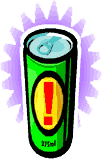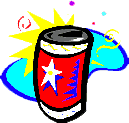Neuroscience For Kids
Alcohol, Energy Drinks and Breath Testing
June 8, 2009

Did you know that many popular energy drinks contain ALCOHOL? They do! Even those drinks that are supposed to be "non-alcoholic." In fact, some people who have tested positive on an alcohol breath test have claimed that they only drank a "non-alcoholic" energy drink. Can one of these energy drinks really cause someone to test positive on an alcohol breath test? Researchers in Missouri set up an experiment to find out.
 First, the amount of alcohol in 27 different energy drinks was
measured. The drinks tested included Red Bull, Full
Throttle, and Rockstar. All but one drink had a detectable
alcohol level (greater than 0.005%). In 13 of the 27 drinks, the alcohol
concentration was above 0.06% and in 9 of the 27 drinks, the alcohol
concentration was at least 0.096%. (NOTE: In the United States, if
the amount of alcohol in a drink is less than 0.5%, it does not have to be
listed on the label.)
First, the amount of alcohol in 27 different energy drinks was
measured. The drinks tested included Red Bull, Full
Throttle, and Rockstar. All but one drink had a detectable
alcohol level (greater than 0.005%). In 13 of the 27 drinks, the alcohol
concentration was above 0.06% and in 9 of the 27 drinks, the alcohol
concentration was at least 0.096%. (NOTE: In the United States, if
the amount of alcohol in a drink is less than 0.5%, it does not have to be
listed on the label.)
Although the amount of alcohol in the tested energy drinks was very low, the scientists investigated the possibility that these small levels of alcohol could be detected by a breath test. They asked test subjects to drink a full can or bottle of an energy drink and then gave each subject an alcohol breath test 1 minute and 15 minutes after the drink was finished.
![]() For 11 of the 27 energy drinks, the alcohol breath test DID detect the
presence of alcohol if the test was given within 1 minute after the drink
was consumed. However, alcohol could NOT be detected for any of the
drinks if the breath test was given 15 minutes after the drink was
consumed.
For 11 of the 27 energy drinks, the alcohol breath test DID detect the
presence of alcohol if the test was given within 1 minute after the drink
was consumed. However, alcohol could NOT be detected for any of the
drinks if the breath test was given 15 minutes after the drink was
consumed.
 The amount of alcohol in energy drinks is very low, but it
can be detected by sensitive equipment. The researchers estimate
that a man weighing 175 pounds would have to quickly drink 200 oz (25
cups) of an energy drink to get a blood alcohol level of 0.02%. In the
United States, a blood alcohol level of 0.08% (80 mg/dL) is regarded as
the legal limit for operating a motor vehicle for people who are 21 years
or older. However, people younger than 21 years are not allowed to drive
a car with any level of alcohol in their system.
The amount of alcohol in energy drinks is very low, but it
can be detected by sensitive equipment. The researchers estimate
that a man weighing 175 pounds would have to quickly drink 200 oz (25
cups) of an energy drink to get a blood alcohol level of 0.02%. In the
United States, a blood alcohol level of 0.08% (80 mg/dL) is regarded as
the legal limit for operating a motor vehicle for people who are 21 years
or older. However, people younger than 21 years are not allowed to drive
a car with any level of alcohol in their system.
| Did you know? |
|
Reference and further information:
- Lutmer, B., Zurfluh, C. and Long, C., Potential effect of alcohol content in energy drinks on breath alcohol testing, J. Analytical Toxicol.,, 33:167-169, 2009.
- Alcohol and the Nervous System - Neuroscience for Kids
- FDA Dealcoholized Wine and Malt Beverages - Labeling
Copyright © 1996-2009, Eric H. Chudler, University of Washington
